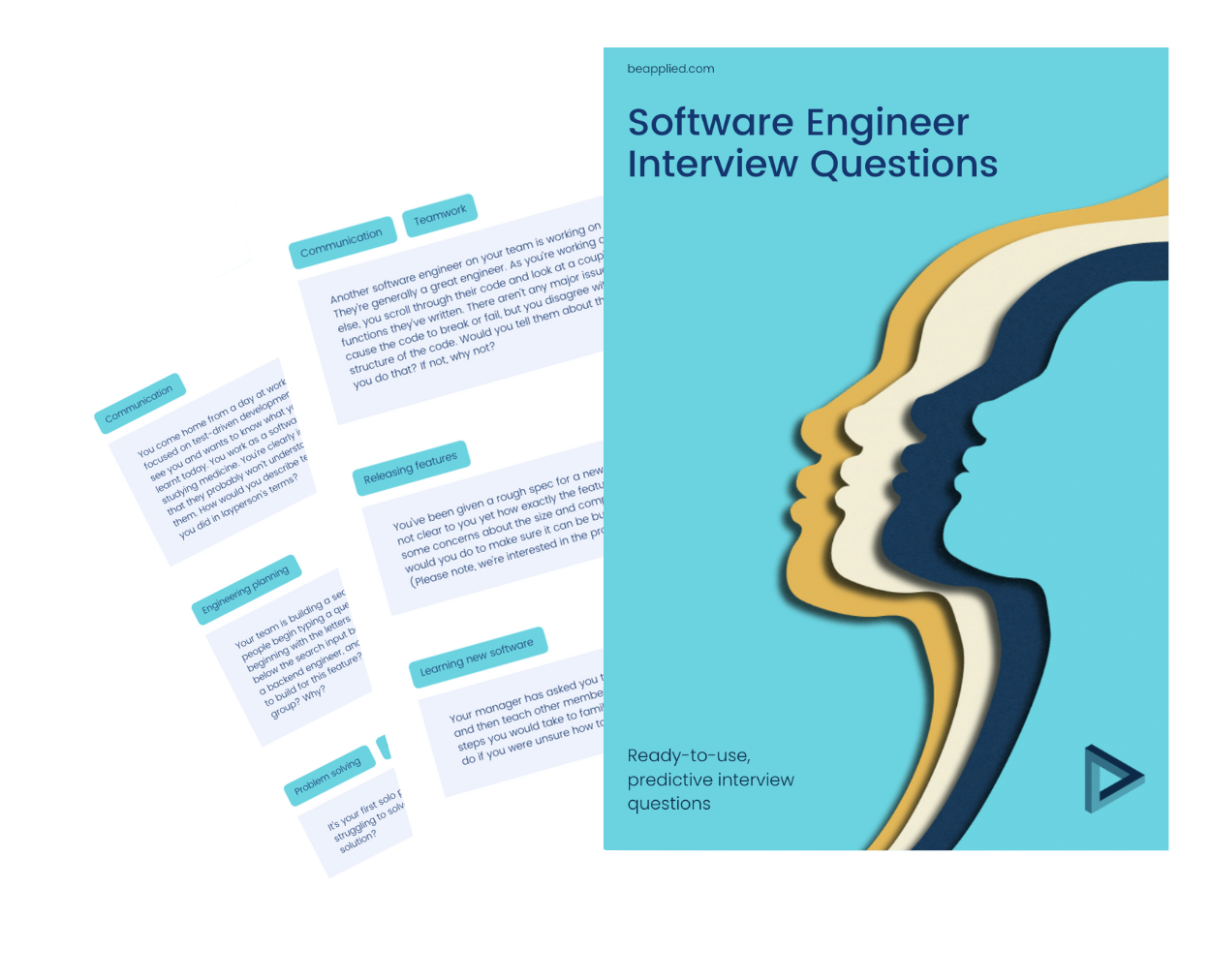Software Engineer Interview Questions

About this role
Software engineers (also called Software Developers) design and create code for web applications and programs.
Software engineer responsibilities
- Writing well-designed code
- Deploying new features and evaluate user feedback
- Troubleshooting issues with software/fixing bugs
- Developing quality assurance procedures
- Executing project plans
- Applying best practices and standard operating procedures
What skills should you be looking for?
Your team has been tasked with building a brand new product for the business and you’re participating in an architectural whiteboarding session with the rest of your team about how the different components that underpin this new product should be structured. You’ve proposed a particular design/architectural pattern but someone on your team disagrees with you (e.g. you feel the system should be orchestrated vs choreographed, or you feel the system should use a particular type of web-framework rather than some other). - How do you resolve the disagreement? - What specific techniques might you use or what style might you adopt in this situation?
Your team is building a search autocomplete feature. That is, as people begin typing a query into a search box, popular queries beginning with the letters they’ve entered show up in a selectable list below the search input box. On your team, there’s a frontend engineer, a backend engineer, and yourself. What components would you need to build for this feature? How would you divide the work between the group? Why?
Another software engineer on your team is working on a new feature. They’re generally a great engineer. As you’re working on something else, you scroll through their code and look at a couple of the new functions they’ve written. There aren’t any major issues that would cause the code to break or fail, but you disagree with the style and structure of the code. Would you tell them about this? If so, how would you do that? If not, why not?
You've been given a rough spec for a new feature to implement. It's not clear to you yet how exactly the feature will work. You also have some concerns about the size and complexity of the feature. What would you do to make sure it can be built and launched successfully? (Please note, we're interested in the process and your approach.)
t’s been a busy week and it’s now late on Friday. You have four things that you’ve yet to get to this week.
1. One of the sales team asked you today to add a feature to the site to support a large sale they're trying to close. This feature is small but the sales team want to close today, and the team's weekly prioritisation meeting isn't until Monday.
2. A customer has emailed about a bug on the site preventing them from accessing their account.
3. You've been asked if you can step in to replace a speaker at a technical event you were attending tonight. It'd be a good opportunity to talk about some aspects of tech you find interesting and good exposure for us, but you need time to edit a talk you gave elsewhere recently.
4. It's your week to do the weekly team update and you’ve not yet quantified your team’s progress against team goals for this month or set the priorities for the coming month. The meeting is on Monday morning.
Imagine you only have time to do two (and only two!) of these tasks, which two do you choose and why?
Note: as an engineering team we do not work at weekends.
What are structured interview questions?
Structured questions (or work samples) are highly predictive, job-specific questions designed to simulate parts of a job.
Structured work sample questions are the most predictive form of assessment you can use. Why? Because they directly test for skills by asking candidates to think as if they were already in the job.
Diversity
Testing for skills instead of just experience makes interviews a more inclusive process. 60%+ of candidates hired through our process would've been missed using CVs/traditional interviews - most of whom are from underrepresented groups.
Accuracy
By simulating tasks that would realistically occur in the role, you can see how candidates would think and work should they get the job.What could be more predictive than having candidates do small parts of the job before actually getting it?
Candidate experience
Candidates genuinely enjoy being given a chance to showcase their ability - this is why we have a 9/10 average candidate experience rating (including unsuccessful candidates).

Decide on the skills you’re looking for
Choose 6-8 core skills required for success in the role. These can be a mix of hard, technical skills as well as soft skills and general working characteristics.You could also include one or two of your organisation's most relevant values.
Think of scenarios that would test these skills
Next, come up with either everyday tasks or rarer, more challenging scenarios that would test some of these skills. They can be day-to-day duties, bigger projects or specific dilemmas that a candidate may realistically face. Should they get the job.
Pose scenarios hypothetically to create your questions
Instead of your typical ‘tell me a time when’ questions, ask candidates what they would do if faced with a given scenario.It's not that experience doesn't have any value… it's just more predictive to test directly for skills, without making assumptions based on background.
Give yourself scoring criteria
Want to make more data-driven hiring decisions? Score candidates against set criteria.We’d recommend starting out with a simple 1-5 star scale and a few bullet points noting what a good, mediocre and bad answer might include.

Use review panels
Having team members join your interviews will result in fairer, more accurate scores.Three is the magic number - you’ll start seeing diminishing return after that

.svg)